Hundreds arrested at anti-Putin demonstrations in Russia
It comes two days before Putin's inauguration as president for a fourth term.
Police have arrested hundreds of protesters at opposition rallies across Russia called on Saturday to protest against Vladimir Putin, two days ahead of his inauguration as president for a fourth term.
Thousands joined the demonstrations in dozens of cities that were called by opposition leader Alexey Navalny as a display of dissent ahead of the inauguration on Monday, gathering under the slogan "He's not a czar to us" as they protested Putin's extended rule during which he has stifled political opposition.
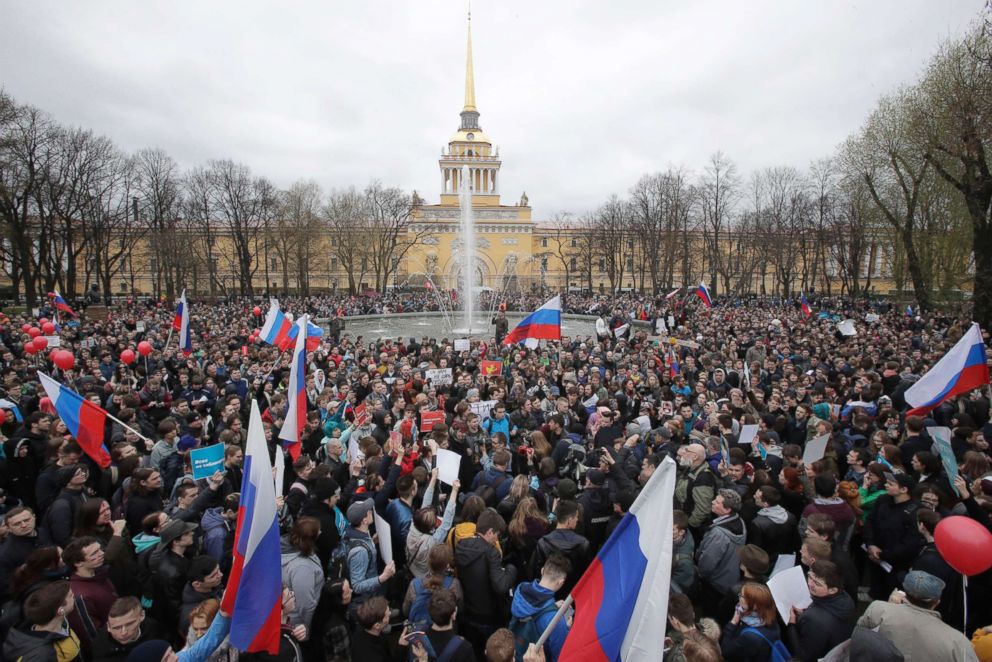
Navalny, an anti-corruption campaigner who has become Putin’s most troublesome political opponent, was detained as he approached a rally in central Moscow, where a few thousand people had gathered at the city's Pushkin Square.
Mobile phone video shot at the rally showed Navalny being picked up by riot police and dragged by his arms and legs into a van.
Smaller rallies -- ranging from crowds of a few dozen to several hundred-- took place across Russia, from Sochi on the Black Sea to Yakutia in Russia’s remote east, where 75 people were reported to have been detained.
In Moscow and many other cities, authorities had refused Navalny's supporters' request to hold a rally at the site, and declared it unauthorized. Moscow's mayor's office had offered an alternative site for a rally, but Navalny rejected that offer, saying it violated people’s rights to hold a demonstration in the city center and calling it a “provocation.”
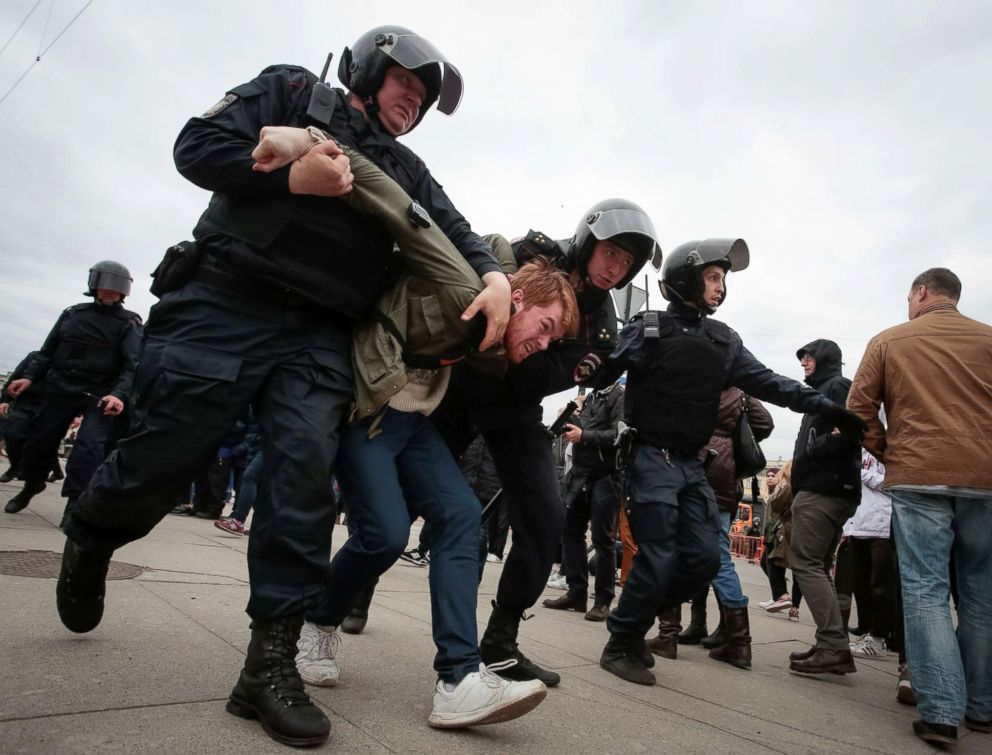
Shortly after the protests began, Moscow police in riot gear ordered demonstrators to disperse. They surrounded protestors who were standing peacefully in the square and then lines of officers dived aggressively through the crowd, brandishing clubs and dragging out those holding placards, sometimes beating those that resisted.
Navalny's supporters and police both confirmed hundreds had been arrested, but they gave differing figures. By evening local time, over 1,607 people had been arrested, including at least 700 in Moscow, according to OVD Info, a group that monitors detentions. Police in Moscow said they had detained around 300 people.
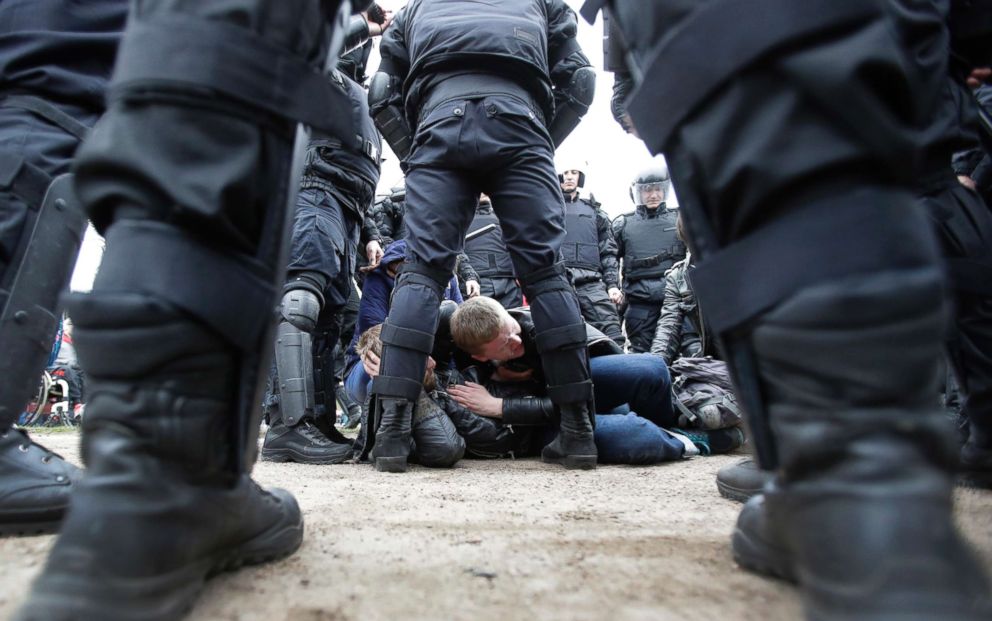
Authorities in Moscow said police behaved professionally and in line with the law. The head of the city’s security department, Vladimir Chernikov, told the news agency Interfax that the police had acted “properly and calmly” and criticized the rally’s organizers for making “provocations.”
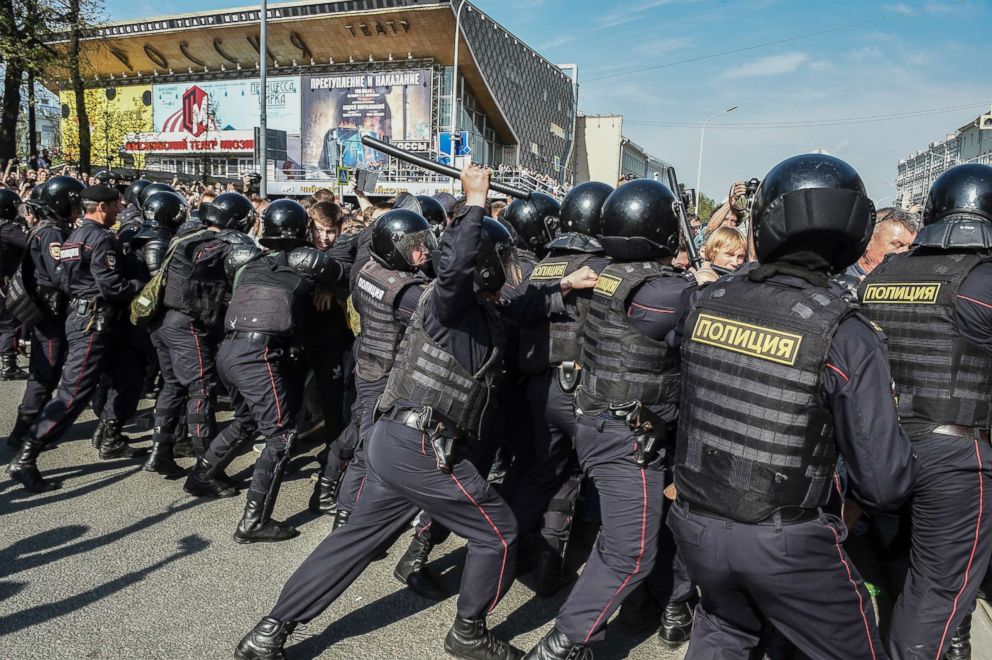
The demonstrations came as Putin prepares to be inaugurated on Monday at a ceremony in the Kremlin for a fourth term as president, having already led Russia for 18 years. Putin was re-elected in mid-March with over 76 percent of the vote, in an election that was criticized by international monitors as marked by pressure on voters and lacking real competition.
Putin has genuine popularity in Russia and with the country’s media dominated by the Kremlin and the opposition marginalized, Putin's continued rule has never been in doubt. His critics have therefore dubbed Monday’s inauguration -- which will be held with pomp in the Kremlin's gilded halls -- a coronation.
In a reference to that, some demonstrators in Moscow wore paper crowns; one man dressed in a full king costume was hauled away by police.
"I'm 19. I've been alive as long as he's been a president," Igor, a 19-year-old student said of Putin, as riot police grabbed people around him at the Moscow rally.
"They are just taking people, beating them up for holding a protest sign. That's not democracy. That's dictatorship. That's like Soviet Union stuff," Igor, who didn't want to give his name for fear of repercussions, added.
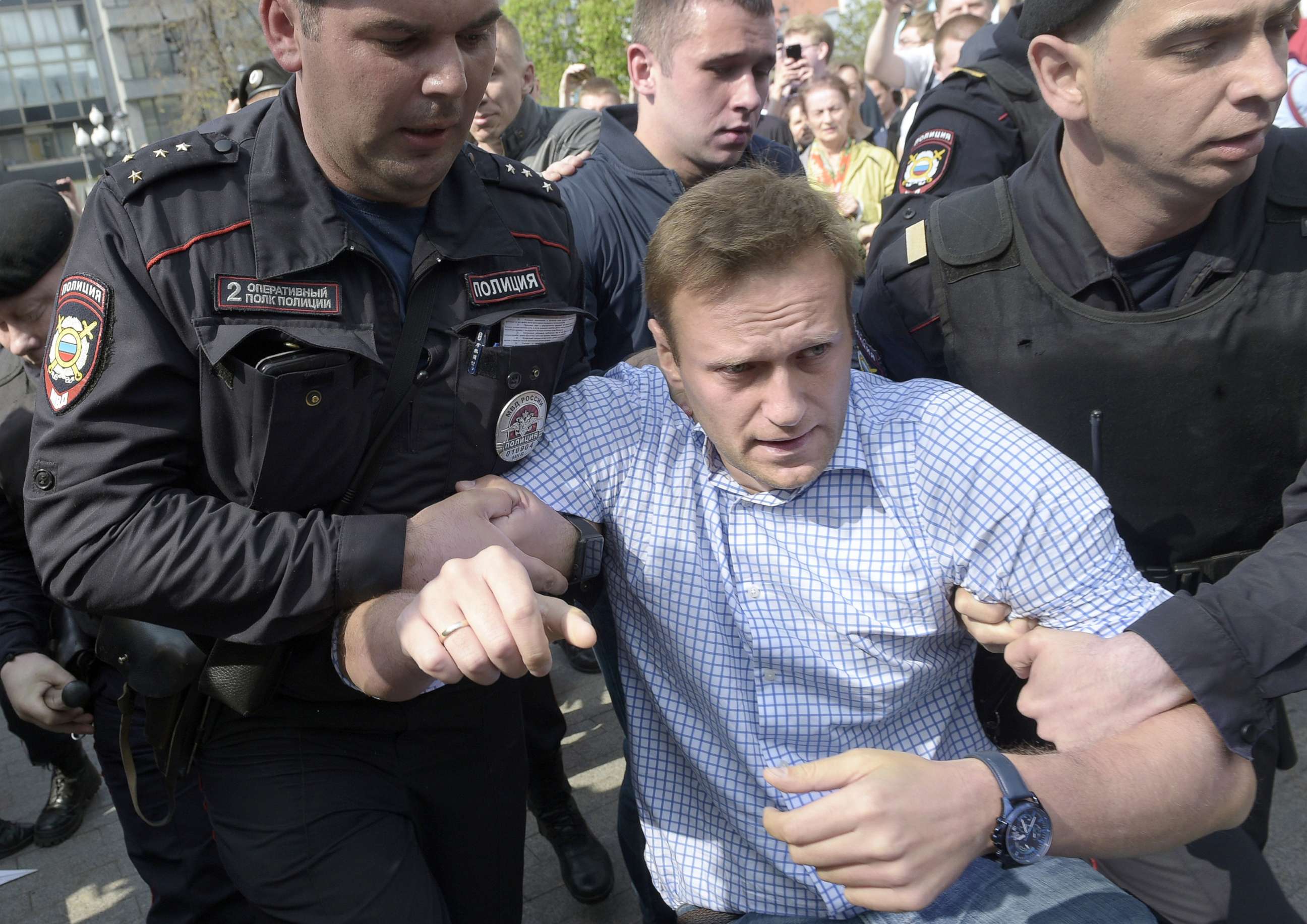
The protests will register little on Putin's hold on power in Russia, where he remains widely popular. Instead, they illustrate the flickering opposition that still exists in the country, as well as the authorities’ low tolerance for public dissent and willingness to use heavy-handed tactics against it.
Ahead of the protest, rights activists warned the protests should be allowed to go ahead. “Rather than brutally stamping out dissent, the Russian government should respect the rights to freedom of expression and peaceful assembly,” Denis Krivosheev, deputy director for Eastern Europe at Amnesty International said in a statement Friday.
The rally was the latest called by Navalny, who has held them regularly over the last two years and who has become Putin’s most substantial political opponent.
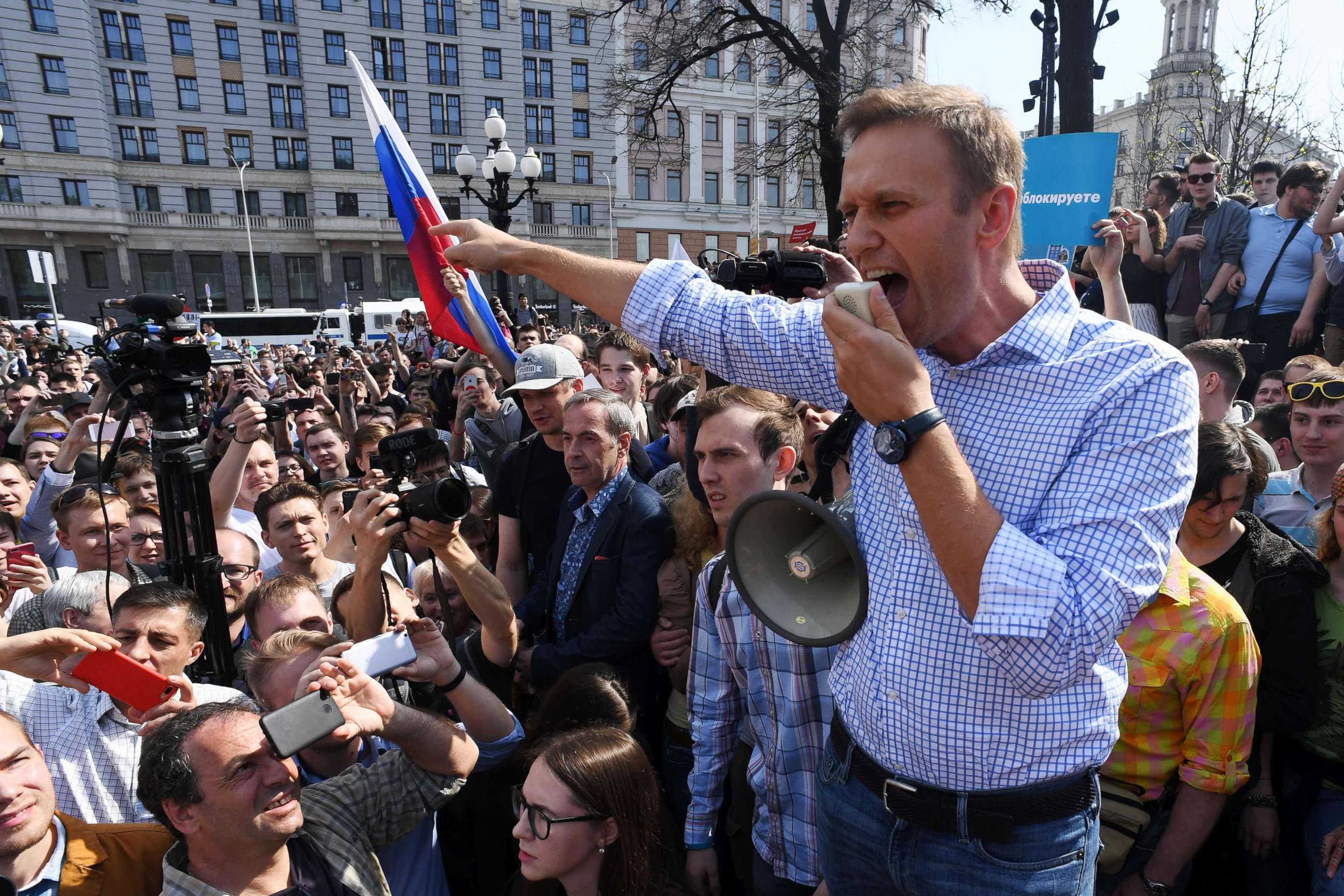
A former lawyer, Navalny has attracted a sizeable following, particularly among the young, through his irreverent investigations into alleged corruption among the Kremlin elite. He has converted that into a grass-roots political movement with thousands of volunteers across Russia.
The Kremlin has responded by harassing Navalny and his supporters. Police regularly search the group’s offices and some of his volunteers have been attacked. Navalny was prevented from running in the election, kept off the ballot by a fraud conviction that he says is trumped up.
Ahead of Saturday's rallies, several organizers from Navalny's group were detained in a number of regions. Navalny himself is regularly arrested and last year was almost blinded when anti-septic was thrown into his eyes by a pro-Kremlin activist.
On Saturday, a counter-demonstration by members of the radical pro-Putin group, NOD, occupied the Moscow square before the Navalny supporters arrived. Approximately 40 of them, some dressed in Soviet military uniforms and singing with an accordion player, confronted the Navalny supporters, yelling slogans at them.
Police later arrested some of the pro-Putin supporters, but others seemed to be working with the officers to help corral the Navalny supporters. A group of Cossacks, an ultra-nationalist community descended from Tsarist-era horsemen, joined in chasing demonstrators.
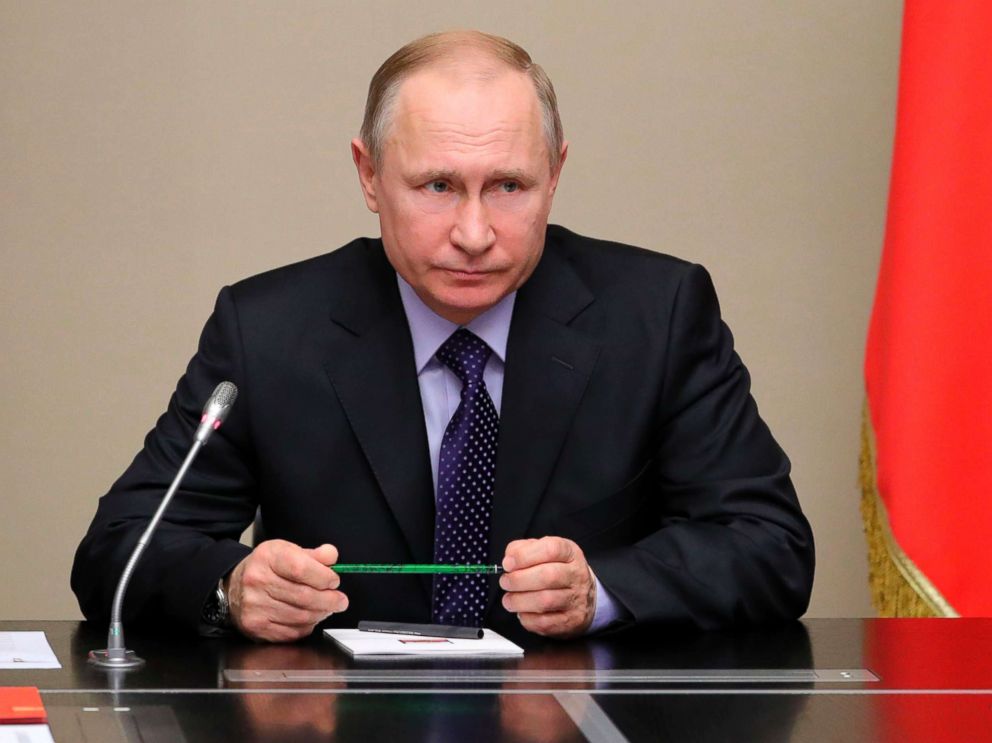
The chaotic arrests in Moscow were an echo of protests held the day before Putin's last inauguration in 2012, which were broken up violently with large-scale arrests. Dozens of criminal cases were later brought against demonstrators, some of whom received harsh prison sentences that were criticized by human rights groups.
The so-called "Bolotnaya cases," named after the square close to the Kremlin where the protests took place, cast a chill on Russia's opposition scene, which has become increasingly marginal since. The crowd on Saturday was smaller than that 6 years ago.




